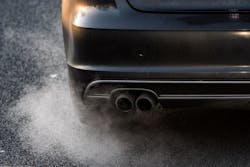EU Accuses BMW, Daimler and VW of Breaking Antitrust Rules
The European Union warned German car giants BMW, Daimler, and Volkswagen on April 5 that a preliminary inquiry has concluded they colluded to avoid competing on emission control technology.
Already reeling in the wake of the devastating "dieselgate" emissions cheating scandal that broke in 2015, the German carmakers will have to respond to the EU's findings, which could result in stiff penalties if the European Commission decides to pursue a cartel case against them.
Volkswagen's admission to manipulating 11 million vehicles worldwide to appear less polluting unleashed a wave of anger at the auto industry, and the Commission launched an in-depth cartel investigation into the three companies.
"As a result, European consumers may have been denied the opportunity to buy cars with the best available technology. The three manufacturers now have an opportunity to respond to our findings," EU competition commissioner Margrethe Vestager said.
The meetings allowed them to limit the introduction of "AdBlue" or urea to diesel engine exhaust gases, reducing its effectiveness as a way to produce cleaner emissions, the statement said.
The firms also -- "in the Commission's preliminary view" -- colluded to avoid or delay introducing OPF particle filters that reduce harmful particles in petrol exhaust fumes.
The findings form the basis of a "statement of objections" to which the firms will have a chance to respond before the Commission decides whether to pursue a case under competition rules banning cartel agreements.
Hefty Fines
If the Commission finds there is sufficient evidence of an infringement, "it can adopt a decision prohibiting the conduct and imposing a fine of up to 10% of a company's annual worldwide turnover."
A VW spokesman confirmed to AFP that the German automaker had received the report and would "examine the complaints and issue a statement after evaluating the investigation file as part of its cooperation".
BMW also said it would examine the "statement of objections", adding that it "regards these proceedings as an attempt to equate permissible coordination of industry positions regarding the regulatory framework with unlawful cartel agreements".
A spokeswoman from Daimler, which makes Mercedes-Benz cars, meanwhile told AFP the firm was aware of the report but had already been cooperating with investigators and "does not expect to receive a fine in this matter".
The Commission's statement said the investigation was "limited to an alleged violation of competition law" and is "not about possible breaches of environmental legislation".
It emphasized the investigation was also separate from other continuing probes, including those "into car manufacturers and the use of illegal defeat devices to cheat regulatory testing" in the dieselgate scandal.
The Commission can impose a heavy fine on companies that make agreements among themselves to the detriment of customers, while those that come forward and disclose cartels often get off without a fine.
Its biggest-ever fine of 2.93 billion euros was handed to Europe's top truck makers -- including Daimler -- in 2016 for colluding over 14 years to fix prices and dodge the costs of stricter pollution rules.
<Copyright Agence France,Presse, 2019
About the Author
Agence France-Presse
Copyright Agence France-Presse, 2002-2025. AFP text, photos, graphics and logos shall not be reproduced, published, broadcast, rewritten for broadcast or publication or redistributed directly or indirectly in any medium. AFP shall not be held liable for any delays, inaccuracies, errors or omissions in any AFP content, or for any actions taken in consequence.
